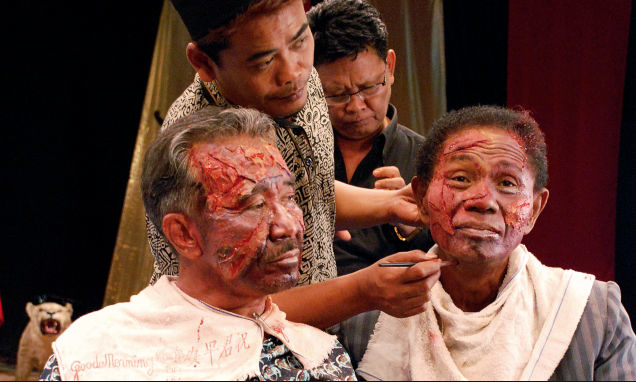
Anwar Congo (Right) dressing up ready to re enact the burning of a village. Notice his face coming across very happy, this is not something you would have expected after seeing what he has done in the past.
Joshua Oppenheimer was in Indonesia for 8 years and over that period of time he built up a relationship with the subject, Anwar Congo. You can tell this because at the beginning of the documentary Congo seemed very proud of all the horrific things he had done, showing extremely little remorse for the actions he took. Contrasting this, towards the end of the documentary he broke down in tears after visiting the place where he carried out the torture and killings. This clearly conveyed the difference in relationship between Joshua and Anwar, as he became more comfortable with his company he felt he could show how he truly felt. Another way in which their relationship evolved was with the way Anwar Congo and his accomplices referred to Joshua Oppenheimer. At first they called him by his full name "Joshua" and throughout the documentary they began calling him "Josh" which shows how the relationship was at first more of a work client, and then progressing into more of a friendship. This helped the documentary because the audience could see the progression of how Anwar Congo felt about the scenario before meeting Joshua Oppenheimer and after he had known him for 8 years.
The documentary was created to portray the events of the 1965-66 in Indonesia, to do this he asked the subjects to re-create the actions to make into a big "Hollywood" film. When they re-create the events they try to make it as near to real as possible, for example, when they wanted to film a scene of which they are burning down a small village that belongs to Chinese people, they actually used a real village and forced the residents to leave just for the purpose of the film. This makes the documentary look as though not much has actually changed since that time period, the "Gangsters" are still in power and still use force to get what they want.
The documentary was originally put together to sway the minds of those who worked for the government in that time, to make them realise that what they had done was horrific and wrong. One of the quotes from Joshua Oppenheimer was "You celebrate mass killing so you don't have to look yourself in the mirror." so he wanted the subjects to stop hiding the fact that what they did was wrong.
No comments:
Post a Comment